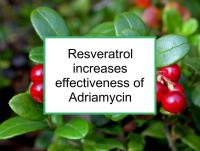Resveratrol, a polyphenol found primarily in grapes, berries, and nuts, has been found to inhibit the growth of both hormone receptor positive (ER+/PR+) and hormone receptor (ER-/PR-) breast cancer cells, without being toxic to normal cells. While resveratrol is a phytoestrogen, it exerts chemopreventive effects through multiple pathways.
Resveratrol has also been shown to increase the effectiveness of a variety of breast cancer treatments, including radiotherapy, aromatase inhibitors, the chemotherapy drugs paclitaxel, docetaxel, doxorubicin, Cisplatin, and Alkeran (Melphalan), as well as the epidermal growth factor receptor (EGFR) inhibitor Iressa (gefitinib).
In addition, resveratrol has been shown to reduce doxorubicin-induced cardiomyopathy (heart muscle damage that can result in heart failure). Now a new study has reported how resveratrol enhances the therapeutic effects of doxorubicin.
Best food sources of resveratrol
Red grapes and purple grape juice, blueberries, and cranberries all have high resveratrol content and have also been found to associated with reduced breast cancer risk. Other foods with significant levels of resveratrol include strawberries, peanuts, and pistachio nuts. Blackberries and raspberries also contain some resveratrol. Red wine is a well known source of resveratrol. However, drinking red wine has been shown to be harmful for breast cancer patients, on balance, as a result of its alcohol content.
Resveratrol supplements are not recommended
Safe and effective dosages of resveratrol supplements have not been established. Cell and animal studies suggest that taking resveratrol in concentrated form could have unintended adverse effects, including potentially increasing the rate of proliferation, migration, and invasion of breast cancer cells at some dosage levels.
One study reported that resveratrol alone promoted mammary tumor growth and metastasis in a mouse model of ER- breast cancer whereas it inhibited it in combination with quercetin and catechin (other grape polyphenols). Another study found that supplementation with zinc plus resveratrol in a rat model of breast cancer substantially increased the rate of carcinogenesis and the number of carcinogen-induced mammary tumors.
Efforts are under way to develop drugs based on resveratrol that can be used to increase the potency of chemotherapy. In the mean time, we urge those undergoing breast cancer treatment to obtain resveratrol by consuming foods rather than taking it in supplement form.
Latest research shows how resveratrol potentiates doxorubicin
The study referenced at the beginning of this news story was designed to find proteins in hormone receptor positive MCF-7 breast cancer cells that are affected by resveratrol in a way that suggests enhanced chemopreventive or treatment effects. The authors observed significant changes in the expression of a total of 16 proteins in resveratrol-treated MCF-7 cells, including heat shock protein 27 (HSP27).
HSP27 overexpression has been associated with inhibition of cancer cell apoptosis (programmed cell death) and resistance to cancer treatment. The authors first showed that resveratrol induced apoptosis in MCF-7 cells. They then evaluated the chemosensitization effect of increasing concentrations of resveratrol in combination with doxorubicin in MCF-7 breast cancer cells, demonstrating that resveratrol effectively sensitized MCF-7 cells to the treatment. Finally, the authors evaluated the role of HSP27 inhibition in treatment effectiveness, finding that HSP27 inhibition enhanced the cytotoxicity of doxorubicin.
The authors conclude that resveratrol could potentially improve the therapeutic effects of doxorubicin. In addition, altering HSP27 levels using natural agents such as resveratrol might be an effective adjuvant in breast cancer therapy.
Please see our article on breast cancer diet during doxorubicin chemotherapy for more information on how to optimize treatment and reduce side effects.
